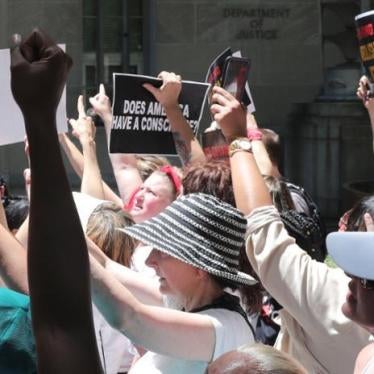|
Letter
Hunger Strikers in ICE Detention at Risk
Letter to US Immigration and Customs Enforcement
Acting Director Ronald Vitiello
US Immigration and Customs Enforcement
500 12th St., SW
Washington, DC 20536
RE: Treatment of Hunger Strikers in ICE Detention
Dear Director Vitiello,
I write to share our concerns about the treatment of a hunger striker at Northwest Detention Center in Tacoma, Washington and to ask for careful review of the treatment of hunger strikers throughout the US immigration detention system.
Grace Meng, an attorney and senior researcher in the US Program at Human Rights Watch, visited the detention center on September 13-14. She interviewed Viacheslav Poliakov, a Russian national and asylum seeker, as well as others who had been on or currently are on hunger strike. We write now because we are deeply concerned about reported threats of force-feeding and disciplinary measures that are not warranted by a peaceful hunger strike.
As you know, the detainees who are or were on hunger strike at Northwest Detention Center are not the first ICE detainees to have gone on hunger strike. ICE has obtained court orders to force feed hunger striking detainees in the past, and there have been allegations of unwarranted disciplinary measures against hunger strikers at detention centers around the country. As the Trump administration seeks to increase the number of people detained and to limit the availability of release, including for asylum seekers, the desperation of people who have been detained for long periods will likely grow. It is therefore urgent that you review treatment of hunger strikers and ensure they are treated humanely and with dignity.
Threat of Force-Feeding
Mr. Poliakov told Human Rights Watch he and two other men started their hunger strike on August 22. He stopped his strike on or around September 21. Throughout his time, he said ICE officers threatened him with force feeding. About two weeks before he ended his strike, Mr. Poliakov said that he saw several officers gather around another detainee, who has also been on hunger strike since August 22. He says he was told ICE had obtained a court order to tube-feed that detainee, and that he would be force-fed as well. Under threat of being force-fed, he and that detainee began drinking electrolytes.
Force-feeding through a tube can be cruel, inhuman, and degrading. Debilitating risks of force-feeding include major infections, pneumonia, collapsed lungs, heart failure, post-traumatic stress disorder and other psychological trauma.
Because of force-feeding’s invasive nature, the World Medical Association (WMA), the preeminent international organization in the field of medical ethics and practice, has repeatedly condemned force-feeding of competent prisoners. The WMA’s Tokyo Declaration, adopted in 1975, states that doctors shall respect a competent prisoner’s right to refuse artificial feeding.World Medical Association, Declaration of Tokyo - Guidelines for Physicians Concerning Torture and other Cruel, Inhuman or Degrading Treatment or Punishment in Relation to Detention and Imprisonment, 1975, as revised, 2006, available at http://www.wma.net/en/30publications/10policies/c18/index.html (“Where a prisoner refuses nourishment and is considered by the physician as capable of forming an unimpaired and rational judgment concerning the consequences of such a voluntary refusal of nourishment, he or she shall not be fed artificially.”) In its Declaration of Malta on Hunger Strikers, the WMA states that “[f]orcible feeding is never ethically acceptable. Even if intended to benefit, feeding accompanied by threats, coercion, force or use of physical restraints is a form of inhuman and degrading treatment.”World Medical Association, Declaration of Malta on Hunger Strikers, 1991, as revised 2006, available at http://www.wma.net/en/30publications/10policies/h31/index.html. The American Medical Association, a member of the WMA, has endorsed these unequivocal principles. The International Committee of the Red Cross has similarly stated: “The ICRC is opposed to forced feeding or forced treatment; it is essential that the detainees’ choices be respected and their human dignity preserved.”Hunger strikes in prisons: the ICRC’s position (January 31, 2013), available at https://www.icrc.org/en/document/hunger-strikes-prisons-icrc-position.
We request that you allow independent medical professionals to review and monitor the status of any hunger-striking detainees at Northwest Detention Center and throughout the immigration detention system in a manner consistent with international ethical standards.
Alleged Retaliation for Hunger Strike
When Mr. Poliakov began his hunger strike, he reports he was also denied important privileges. After announcing he was starting a hunger strike, he says that he was immediately put into isolation. After three days, he says, he was moved to the medical clinic where he continued to be kept in isolation. He reports that initially, he was denied access to a telephone, the tablet by which he can make calls, the recreational yard, television, newspapers, and the law library. When he asserted that he had a right to access these privileges, he alleges that an ICE officer told him he could not have access because he was on hunger strike. Another man who was on hunger strike told the Human Rights Watch researcher he also had been denied access to the law library and other privileges.
After several days, Mr. Poliakov says, a doctor told him that was not correct, and privileges were restored except for access to the law library. Mr. Poliakov stated that without access to the law library, he could not access the forms needed to file an administrative appeal. Mr. Poliakov is unrepresented in his immigration case. Mr. Poliakov reported that he has continued to orally request access to the law library, and on Monday, September 17, he submitted a request in writing.
Also, on Monday, HRW researcher Grace Meng sent an email to Assistant Field Office Director Drew Bostock asking that Mr. Poliakov’s access to the law library be immediately restored. AFOD Bostock responded that Mr. Poliakov was never denied access to the law library. On Wednesday, September 19, Mr. Poliakov reported he was allowed access to the law library for the first time, for one hour, but kept separate from others in the library. He was finally able to file his appeal.
Isolation and denial of privileges, such as access to the law library, is an unwarranted response to a peaceful hunger strike. Under PBNDS 2011, detainees on hunger strike are to be put under medical observation, and if medically advisable, a detainee on hunger strike is to be isolated for close supervision, observation and monitoring (PBNDS 2011 4.2 Hunger Strikes, II. Expected Outcomes). That does not automatically necessitate isolation and denial of privileges, such as access to materials needed to ensure due process. Mr. Poliakov was peacefully on hunger strike; he was not being isolated due to a communicable disease. Preventing him from communicating with others had no medical therapeutic value.
Please ensure that hunger strikers are not unduly denied any privileges while on a peaceful hunger strike.
Conditions Concerns
Mr. Poliakov told Human Rights Watch he was on hunger strike to protest the inadequate medical treatment he has received for serious medical conditions, and his continued detention for over five months since he presented himself at the San Ysidro port of entry seeking asylum from persecution in Russia.
Investigations by Human Rights Watch and others make clear medical care in immigration detention is often inadequate and sometimes even deadly. According to independent expert analyses of ICE’s own death investigations, poor medical treatment contributed to more than half the deaths in ICE detention from December 2015 through April 2017.Human Rights Watch et al., Code Red: The Fatal Consequences of Dangerously Substandard Medical Care in Immigration Detention, June 20, 2018, available at https://www.hrw.org/report/2018/06/20/code-red/fatal-consequences-dangerously-substandard-medical-care-immigration. 4 Detainees with serious medical and mental health needs should generally not be detained as ICE has demonstrated it is incapable of providing adequate care.
We have heard complaints regarding medical care at Northwest Detention Center from others as well. We recommend independent medical experts be allowed to review medical care at Northwest Detention Center and other detention centers around the country.
Sincerely,
Nicole Austin-Hillery
Executive Director, US Program
Cc: Drew Bostock, Assistant Field Office Director, Northwest Detention Center
Andrew Lorenzen-Strait, ICE-ERO Custody Programs
[1] World Medical Association, Declaration of Tokyo - Guidelines for Physicians Concerning Torture and other Cruel, Inhuman or Degrading Treatment or Punishment in Relation to Detention and Imprisonment, 1975, as revised, 2006, available at http://www.wma.net/en/30publications/10policies/c18/index.html (“Where a prisoner refuses nourishment and is considered by the physician as capable of forming an unimpaired and rational judgment concerning the consequences of such a voluntary refusal of nourishment, he or she shall not be fed artificially.”)
[2] World Medical Association, Declaration of Malta on Hunger Strikers, 1991, as revised 2006, available at http://www.wma.net/en/30publications/10policies/h31/index.html.
[3] Hunger strikes in prisons: the ICRC’s position (January 31, 2013), available at https://www.icrc.org/en/document/hunger-strikes-prisons-icrc-position.
[4] Human Rights Watch et al., Code Red: The Fatal Consequences of Dangerously Substandard Medical Care in Immigration Detention, June 20, 2018, available at https://www.hrw.org/report/2018/06/20/code-red/fatal-consequences-dangerously-substandard-medical-care-immigration.
Your tax deductible gift can help stop human rights violations and save lives around the world.
Region / Country
Related content
Most Viewed
-
June 3, 2025
“They’re Ruining People’s Lives”

-
January 25, 2024
“We’re Dying Here”

-
April 27, 2021
A Threshold Crossed

-
November 25, 2019
A Dirty Investment

-
November 19, 2012
Losing Humanity




